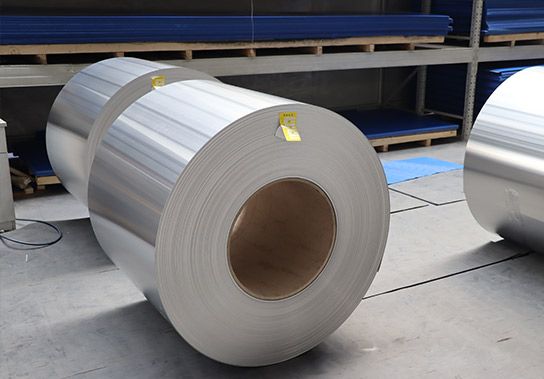Hot rolled aluminum coil refers to a continuous strip of aluminum material made by heating aluminum ingots to above the recrystallization temperature (usually 300-500℃) and rolling them through a rolling mill. During its production process, the aluminum ingot undergoes plastic deformation at high temperature and is finally rolled into a coil. It has the characteristics of uniform organization and stable mechanical properties. It is one of the basic materials in the field of aluminum processing.

1. Manufacturing process
The manufacturing process of hot-rolled aluminum coil made by aluminum coil suppliers mainly includes the following key steps:
- Raw material preparation
Select high-purity aluminum ingots (purity ≥ 99.0%) or aluminum alloy ingots (such as 1xxx, 3xxx, 5xxx series alloys), and adjust the alloy composition according to product requirements.
- Smelting and ingot casting
Put the aluminum ingot into a smelting furnace, melt it into aluminum liquid at 700-800℃, remove impurities and cast it to form an aluminum ingot with a thickness of 100-500mm.
- Heating and homogenization treatment
The ingot is sent to the heating furnace, heated to 350-500℃ and kept warm to eliminate casting stress, make the alloy elements evenly distributed, and improve rolling performance.
- Hot rolling
The heated ingot is rolled through a hot rolling mill for multiple passes, gradually thinning to the target thickness (usually from more than 100mm to 0.5-4.0mm). The rolling speed, temperature and reduction amount need to be controlled during the rolling process to ensure the surface quality and mechanical properties of the plate.
- Cooling and coiling
The rolled aluminum sheet is cooled by air or water cooling, and then coiled into an aluminum coil by a coiler. The surface can be oiled for protection as needed.
- Subsequent treatment (optional)
Some products require annealing, stretch straightening or surface treatment (such as coating, oxidation) to meet the requirements of different application scenarios.
2. Common product specifications
- Alloy grades: 1050, 1060, 1100, 3003, 3004, 5052, 5754, 6061, etc.
- State: O (annealed soft state), H12/H14 (work hardened state), H22/H24 (work hardened + partial annealing), etc.
- Thickness: 0.5-4.0mm (special specifications can be up to 10mm)
- Width: 600-2600mm (adjusted according to rolling mill specifications, mainstream width is 1000-2000mm)
- Coil weight: 5-30 tons (can be customized according to user needs)
3. Advantages and characteristics of hot rolled aluminium coil:
- Balanced mechanical properties
High-temperature rolling makes the aluminum grains refined and evenly distributed, and the tensile strength, elongation and other properties are consistent, suitable for subsequent deep processing (such as stamping, bending).
- Strong processing adaptability
The metal fluidity is high during hot rolling, and large thickness and wide width plates can be rolled, and can meet the processing needs of complex shape parts (such as automobile body plates).
- Significant cost-effectiveness
Compared with cold rolling, the hot rolling process has lower energy consumption and does not require multiple annealing, with high production efficiency, suitable for large-scale industrial production.
- Excellent corrosion resistance
A dense oxide film is easily formed on the surface of the aluminum matrix, combined with the effect of alloy elements (such as magnesium and manganese), it shows good corrosion resistance in humid, acidic and alkaline environments.
- Controllable surface quality
By adjusting the rolling process (such as roller surface roughness and lubrication conditions), different surface states (such as bright surface and matte surface) can be obtained to meet the surface treatment requirements of coating, printing, etc.
4. Application scope of hot rolled aluminum coil:
- Architectural field
Used in the manufacture of curtain wall panels, roof panels, door and window frames, decorative strips, etc., using its light weight, corrosion resistance and aesthetics to improve building performance.
- Packaging industry
As an aluminum foil substrate (such as food packaging foil, pharmaceutical packaging foil), or directly used to make cans, bottle caps, etc., using its barrier properties and ductility.
- Automobile and transportation
Produce body panels, chassis parts, radiators, fuel tanks, etc. to achieve vehicle lightweighting, reduce fuel consumption and emissions.
- Electronics and electrical
Manufacture motor housings, heat sinks, cable trays, etc., using the electrical conductivity and heat dissipation advantages of aluminum.
- Industry and machinery
Used in the manufacture of pressure vessels, pipelines, chemical equipment linings, etc., suitable for corrosion-resistant and pressure-resistant scenarios.
- Aerospace (some high-end alloys)
High-end hot-rolled aluminum coils (such as 2xxx, 7xxx series) can be used to manufacture aircraft skins and structural parts to meet high strength and lightweight requirements.